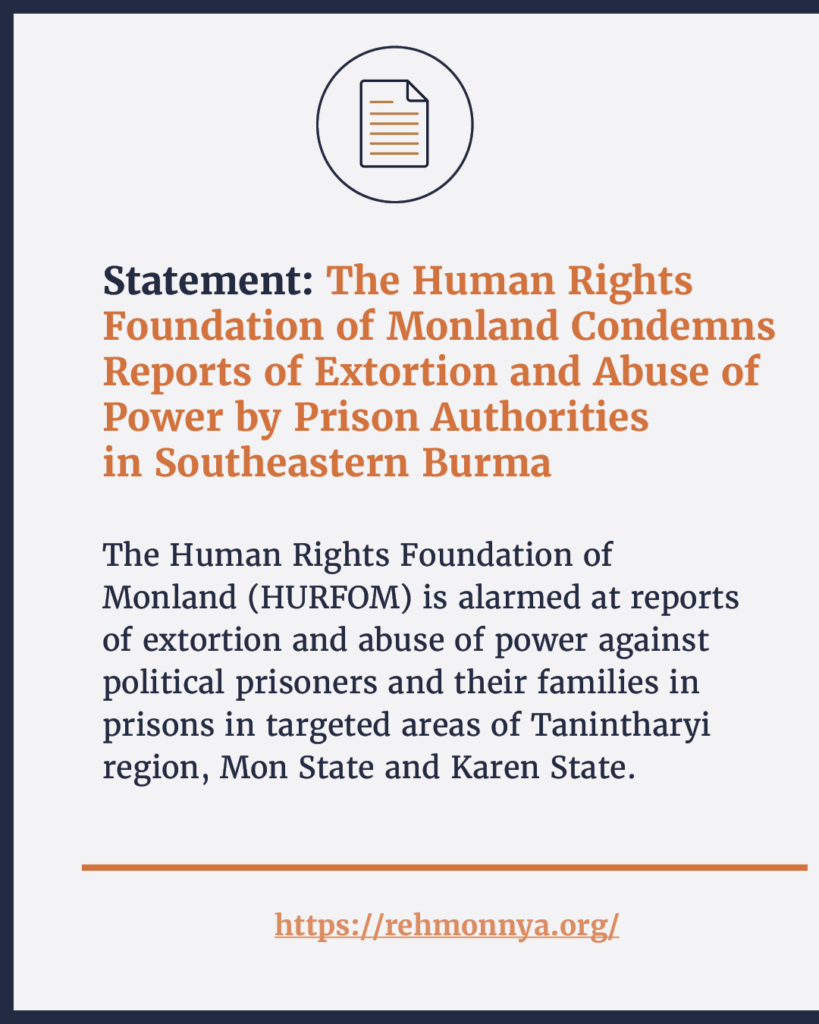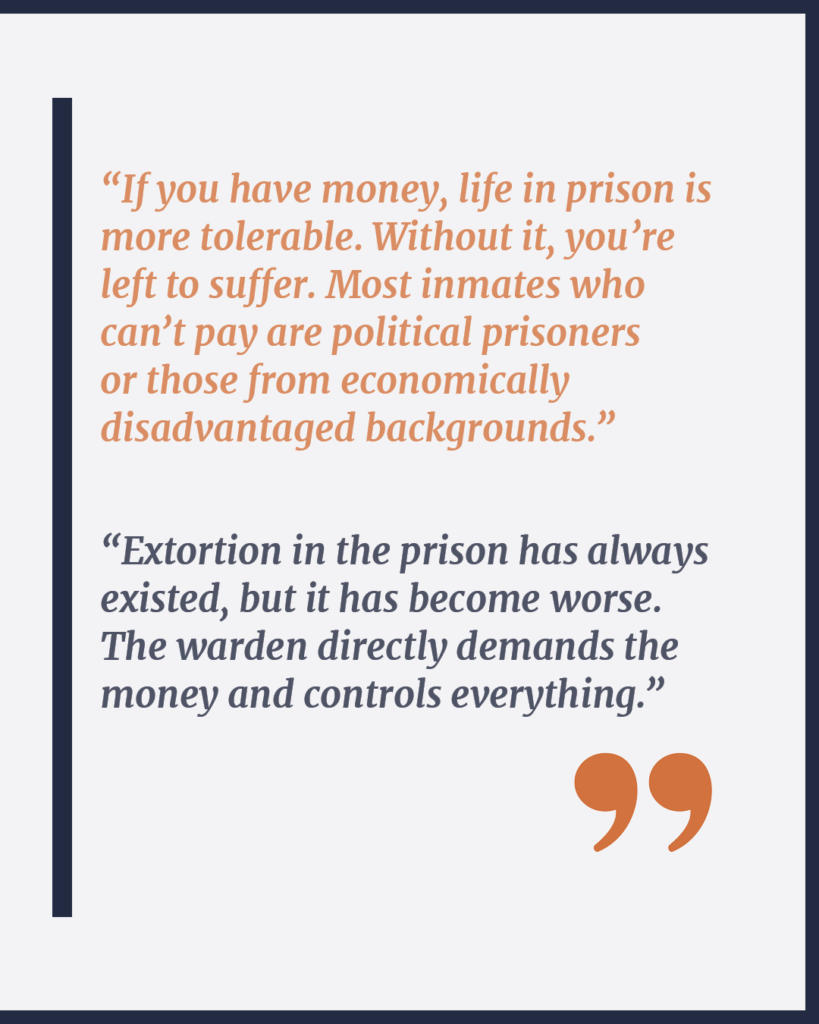The Human Rights Foundation of Monland Condemns Reports of Extortion and Abuse of Power by Prison Authorities in Southeastern Burma
November 28, 2024
For Immediate Release
The Human Rights Foundation of Monland (HURFOM) is alarmed at reports of extortion and abuse of power against political prisoners and their families in prisons in targeted areas of Tanintharyi region, Mon State and Karen State.
Tanintharyi Region
In Dawei, political prisoners and their families have been forced to pay large sums for basic privileges. Fees reportedly include tens of thousands of Myanmar Kyats for changing sleeping quarters, as well as substantial amounts for securing better work assignments within the prison and bribes to expedite medical treatment for ill prisoners.
A family member of an inmate stated: “Extortion in the prison has always existed, but it has become worse. The warden directly demands the money and controls everything.”
The warden’s control over all operations has led to internal conflicts within the prison, including disputes between him and the dormitory leaders, which were reported during the second week of November. Previously, dormitory leaders managed transactions related to transfers within the prison, but this responsibility now lies solely with the warden. This shift has caused frustration among both prison staff and inmates.
While wealthier inmates can afford to pay these bribes and enjoy relative comfort, those who cannot pay face harsher conditions and increased pressure. A former political prisoner who spent over two years in Dawei Prison told HURFOM, “If you have money, life in prison is more tolerable. Without it, you’re left to suffer. Most inmates who can’t pay are political prisoners or those from economically disadvantaged backgrounds.”
In addition to financial extortion, the prison authorities have been accused of reducing food rations. Families state that meals are scaled back, with significant portions cut.
For example, on November 10, inmates were given only half an egg instead of the two eggs typically provided for dinner, prompting protests over unfair treatment from the inmates. Currently, over 1,000 inmates are held in Dawei Prison, with approximately half of them detained on political charges. Families fear that the ongoing extortion and deteriorating conditions will further deepen the hardships faced by their loved ones.
Mon State
In Kyaikmayaw Prison, Mon State, the harshest treatment is not typically directed toward ordinary criminal inmates. Instead, political prisoners—individuals detained for their anti-coup and pro-democracy activities during the Spring Revolution—are subjected to systematic oppression. Under the directives of the military regime’s intelligence networks, prison authorities implement cruel, and degrading measures aimed at breaking the spirits of these prisoners.
In addition to political prisoners, young people unjustly accused of being PDF (People’s Defense Force) members or supporters are currently held in Kyaikmayaw Prison. Reports suggest these individuals endure inhumane treatment and severe torture, with no communication allowed between them and their families. This isolation adds to the uncertainty and anguish faced by their loved ones.
Currently, there are approximately 12 youths detained under charges related to the anti-terrorism act and alleged acts of rebellion against the state. The extent of their suffering highlights the grave human rights abuses occurring within the prison system.
Karen State
Similarly, Taungkalay Prison in Hpa-an, Karen State, serves as a detention site for political prisoners intentionally transferred far from their families, creating emotional and physical distress. Families that travel to meet their loved ones face extortion from prison authorities, who demand bribes before granting visitation rights.
In some cases, the judicial process within the prisons is also manipulated. Military-appointed judges tightly control legal proceedings, frequently denying defence lawyers the opportunity to represent political prisoners effectively, stripping them of any chance for fair legal protection.
Political Prisoners Denied Human Rights in Junta-Run Jails
Political prisoners are intentionally subjected to both mental and physical suffering as a form of punishment for resisting the military dictatorship. For example, prison authorities frequently cut off their access to family visits or food supplies sent by their loved ones, often citing “security concerns” as justification. These restrictions are strategically designed to isolate and demoralize the prisoners.
Access to urgent medical treatment is another critical issue. Political prisoners suffering from skin diseases, chronic diarrhea, or respiratory conditions are often denied timely care. The neglect of these healthcare needs highlights the deliberate cruelty of the system. Additionally, they are forced into physically demanding and strenuous labour and face regular harassment by other inmates, whom the authorities encourage to act as gang leaders to further oppress the political prisoners.
Nai Aue Mon, Program Director of HURFOM, calls for urgent action from the International Committee of the Red Cross, policymakers and stakeholders to address the abuses occurring in junta-run detention facilities. Independent monitoring bodies must be granted access to document conditions and ensure compliance with human rights standards:
“The support, especially from the flexible donors, must be extended to the families of political prisoners, who bear the brunt of these exploitative practices,” he said.
The suffering endured by detainees in Dawei, Kyaikmayaw, Thaton and Taungkalay prisons reflects the junta’s continued oppression of political voices and marginalized communities. Accountability and justice remain critical to ending these abuses and upholding the rights of all detainees.
Media Contact
Nai Aue Mon, HURFOM Program Director
Email: auemon@rehmonnya.org
Signal: +66 86 167 9741
_________________________________________________________________________________________________________
HURFOM was founded by exiled pro-democracy students from the 1988 uprisings, recent activists, Mon community leaders, and youth. Its primary objective is restoring democracy, human rights, and genuine peace in Burma. HURFOM is a non-profit organization, and all its members are volunteers with a shared vision for peace in the country.





















































